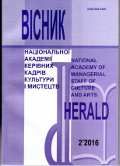MUSICAL INDICATORS OF HISTORICAL PROCESSUALITY IN THE PARALLELISMS OF THE DEVELOPMENT OF CHINA AND EUROPE
DOI:
https://doi.org/10.32461/2226-3209.2.2016.138511Keywords:
music genesis of the historic knowledge, parallelisms of the development of China and Europe, new relationship – semantic acausal relationship, historic process, historic continuumAbstract
The purpose of given work is to discover musical signs of historic knowledge in connection with the reality of chronological parallelisms of musical development of China and Europe of the Middle Ages and New Time. Methodolog-ical basis of the work is an idea about a tone of epoch, put forward by G.Hegel and evolved in the conception of Renais-sance by A.Losev. Scientific novelty of the study is determined by the fact that for the first time it indicates synchroniza-tion of culture reformations of development of China and Europe, provided that, historically interaction and interinfluence were excepted. Conclusions. "New relationship" (after C. Jung) reveals itself – "semantic acausal relationship", which allows to understand the regular nature of chronological coincidences in the history of music culture of China and Europe.
Downloads
Published
Issue
Section
License
Authors who publish with this journal agree to the following terms:
1. Authors retain copyright and grant the journal right of first publication with the work simultaneously licensed under a Creative Commons Attribution License International CC-BY that allows others to share the work with an acknowledgement of the work's authorship and initial publication in this journal.
2. Authors are able to enter into separate, additional contractual arrangements for the non-exclusive distribution of the journal's published version of the work (e.g., post it to an institutional repository or publish it in a book), with an acknowledgement of its initial publication in this journal.
3. Authors are permitted and encouraged to post their work online (e.g., in institutional repositories or on their website) prior to and during the submission process, as it can lead to productive exchanges, as well as earlier and greater citation of published work (See The Effect of Open Access).


